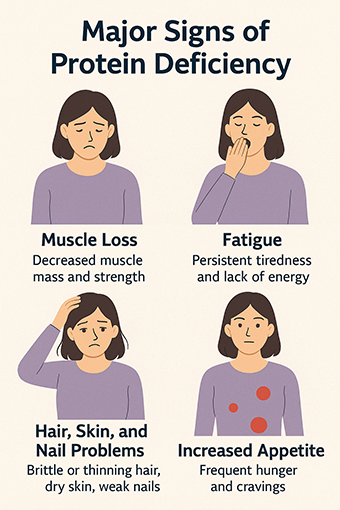
Protein is essential for building all our body’s cells and performing various biological functions, so a deficiency can lead to several problems. Here are some key signs, including the symptoms you mentioned:
Edema (Generalized Swelling): Swelling, especially in the hands, feet, and face, occurs because a type of protein called albumin is lacking. Without enough albumin, the osmotic pressure of the blood cannot be maintained, causing fluid to leak out of the blood vessels.
Fatigue and Lethargy: Protein is crucial for energy production and muscle activity. A deficiency leads to muscle loss and makes you feel tired easily.
Skin and Hair Problems: Protein is the main component of collagen and keratin. A lack of it can make the skin dull and lose its elasticity, and hair may become thin and fall out easily.
Weakened Immunity: Antibodies and immune cells are all made of protein. A protein deficiency weakens the immune system, making you more susceptible to infections.
Fatty Liver: A lack of protein can interfere with the synthesis of lipoproteins, which transport fat out of the liver, leading to the accumulation of fat in the liver.
Joint and Muscle Pain: Muscle and joint tissues can weaken, causing pain. Protein is a key component for building muscles, bones, and connective tissues like cartilage.
Causes and Diagnosis of Protein Deficiency
- Causes
Unbalanced Diet: Not consuming enough protein or having a diet that lacks specific nutrients.
Digestion and Absorption Issues: When stomach and intestinal functions are weak, the body may not properly break down and absorb protein.
Chronic Diseases: Conditions like liver or kidney disease can cause problems with protein metabolism.
Aging: As people get older, their muscle mass and appetite can decrease, and digestive function can decline, making it harder to consume and absorb protein.
- Diagnosis
Blood Test: A blood test measures the levels of Total Protein and Albumin to objectively assess your nutritional status. The albumin level is a particularly good indicator of protein nutritional status.
Dietary and Medical History: A doctor will review your usual diet, digestive function, and medical history to find the underlying cause.
Traditional Korean Medicine (Hanbang) Treatment Methods
In Hanbang, protein deficiency is not treated as a specific disease but is addressed by restoring the body’s balance based on the symptoms and causes. The core focus is on strengthening digestive function and replenishing Ki and Hyeol.
Strengthening Spleen-Stomach (비위, Bi-Wi) Function: In Hanbang, the Spleen-Stomach system is considered vital for digestion and absorption. Treatment aims to strengthen this system to help the body efficiently digest and absorb the protein consumed from food.
Herbal Remedies: Herbs like ginseng, Baekchul, Bokryeong, and Hwanggi are prescribed to fortify the Spleen-Stomach and supplement vital energy (Ki).
Treatment: Acupuncture and moxibustion are used on key meridians to activate Spleen-Stomach function and improve digestion.
Supplementing Ki (vital energy) and Hyeol (blood): Fatigue, lethargy, and a weakened immune system due to protein deficiency can be viewed as a lack of Gi and Hyeol.
Herbal Remedies: Formulas like Samultang (containing herbs like Dangui and Cheongung) are used to supplement blood, while formulas like Bojungikgitang (with ginseng and Hwanggi) are used to boost Ki. The specific prescription is tailored to the individual’s constitution.
Edema Relief: The function of the kidneys and bladder is regulated to ensure proper fluid metabolism and reduce swelling.
Herbal Remedies: Herbs like Bokryeong, Taeksa, and Jeoryeong are used for their diuretic properties.
Hanbang treatment, therefore, involves a customized approach that considers the individual’s constitution and symptoms to address imbalances and supplement what is lacking.